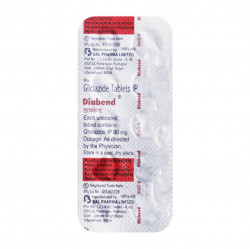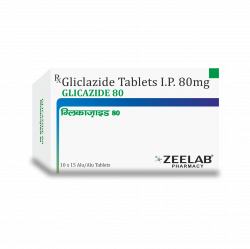Download India's most affordable pharmacy app
- Compare with medicine prices
- Save upto 90% on your medicine bills
COMPOSITION:
Gliclazide (80mg)DESCRIPTION:
Diabend 80mg Tablet contains Gliclazide, an oral medication used to manage type 2 diabetes. It works by stimulating the pancreas to release more insulin and improving the body's sensitivity to insulin. This helps lower blood sugar levels, making it an effective treatment for people with diabetes. Diabend 80mg is commonly prescribed along with a balanced diet and regular exercise to control blood sugar and manage diabetes-related complications.
Uses of Diabend 80mg Tablet
Diabend 80mg Tablet is primarily used to treat the following conditions:
- Type 2 Diabetes Mellitus (non-insulin dependent diabetes)
- Helps in controlling blood sugar levels in adults
- May be used in combination with other diabetes medications
How Diabend 80mg Tablet Works
Diabend 80mg Tablet works by increasing the release of insulin from the pancreas. It also improves the body's sensitivity to insulin, which helps regulate blood sugar levels more effectively. This action makes it an effective medication for people with type 2 diabetes, helping them maintain stable blood sugar levels.
Benefits of Diabend 80mg Tablet
The key benefits of Diabend 80mg Tablet include:
- Helps lower blood sugar levels in people with type 2 diabetes.
- Improves insulin sensitivity and enhances insulin production.
- Reduces the risk of long-term complications associated with diabetes.
- Can be used in combination with other diabetes medications for better control of blood sugar.
How to Take Diabend 80mg Tablet
Diabend 80mg Tablet should be taken exactly as prescribed by your doctor. The usual dosage is one tablet per day, taken with a meal. It is important to follow your doctor's instructions regarding the exact dose and the time of day to take the medication. Swallow the tablet whole with a glass of water, and do not chew or crush it. Regular monitoring of blood sugar levels is advised while using this medication.
Side Effects of Diabend 80mg Tablet
Common side effects of Diabend 80mg Tablet may include:
- Low blood sugar (hypoglycemia)
- Headache
- Dizziness or lightheadedness
- Stomach upset or nausea
- Weight gain
Severe side effects may include:
- Severe hypoglycemia (symptoms include shaking, sweating, confusion, and loss of consciousness)
- Allergic reactions (rash, itching, swelling)
- Yellowing of the skin or eyes (sign of liver problems)
If you experience any severe side effects, stop taking the medication and seek medical help immediately.
Safety Advice
Before taking Diabend 80mg Tablet, consider the following safety precautions:
- Inform your doctor if you have any history of liver or kidney problems.
- Diabend should be used cautiously in people who have a history of hypoglycemia.
- If you are pregnant or breastfeeding, consult your doctor before using this medication.
- Do not skip meals while taking Diabend as it may cause blood sugar levels to drop too low.
- Limit alcohol consumption, as it may increase the risk of hypoglycemia.
Frequently Asked Questions (FAQs)
Q: What is Diabend 80mg Tablet used for?
A: Diabend 80mg Tablet is used to manage type 2 diabetes by lowering blood sugar levels and improving insulin sensitivity.
Q: How should I take Diabend 80mg Tablet?
A: Diabend 80mg Tablet should be taken once daily with a meal, as prescribed by your doctor. Swallow the tablet whole with water.
Q: Can Diabend 80mg Tablet be taken with other diabetes medications?
A: Yes, Diabend 80mg Tablet can be taken with other diabetes medications, but only under the supervision of a doctor to ensure optimal blood sugar control.
Q: What should I do if I miss a dose of Diabend 80mg Tablet?
A: If you miss a dose, take it as soon as you remember. If it's almost time for your next dose, skip the missed dose. Do not take two doses at once.
Q: Can Diabend 80mg Tablet cause hypoglycemia?
A: Yes, Diabend 80mg Tablet may cause low blood sugar, especially if you miss meals or exercise excessively. Be aware of the symptoms of hypoglycemia and follow your doctor's instructions to prevent it.








 Added!
Added!